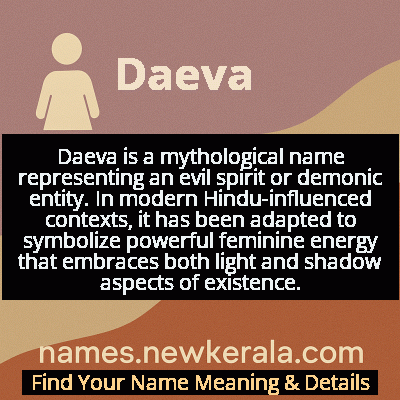Daeva Name Meaning & Details
Origin, Popularity, Numerology Analysis & Name Meaning of Daeva
Discover the origin, meaning, and cultural significance of the name DAEVA. Delve into its historical roots and explore the lasting impact it has had on communities and traditions.
Name
Daeva
Gender
Female
Origin
Hindu
Lucky Number
6
Meaning of the Name - Daeva
Daeva is a mythological name representing an evil spirit or demonic entity. In modern Hindu-influenced contexts, it has been adapted to symbolize powerful feminine energy that embraces both light and shadow aspects of existence.
Daeva - Complete Numerology Analysis
Your Numerology Number
Based on Pythagorean Numerology System
Ruling Planet
Venus
Positive Nature
Harmonious, responsible, caring, and artistic.
Negative Traits
Overly idealistic, superficial, possessive, or jealous.
Lucky Colours
Pink, turquoise.
Lucky Days
Friday.
Lucky Stones
Diamond, turquoise.
Harmony Numbers
2, 3, 9.
Best Suited Professions
Artists, musicians, teachers, healthcare workers.
What People Like About You
Warmth, nurturing nature, artistic flair.
Famous People Named Daeva
Daeva Santos
Contemporary Artist
Known for mystical digital art exploring dark feminine archetypes
Daeva Sharma
Fiction Writer
Author of fantasy novels featuring strong female anti-heroes
Daeva Patel
Mythology Researcher
Published works on comparative demonology across Eastern traditions
Name Variations & International Equivalents
Click on blue names to explore their detailed meanings. Gray names with will be available soon.
Cultural & Historical Significance
In contemporary Hindu-influenced usage, Daeva has been reimagined as representing the darker aspects of divine feminine power, similar to how Kali embodies both destructive and creative forces. This modern interpretation acknowledges the complexity of spiritual beings and the importance of balancing light and shadow in spiritual understanding. The name's journey from Zoroastrian demonology to its current usage demonstrates how ancient concepts can be revitalized and given new significance in modern spiritual contexts.
Extended Personality Analysis
Individuals named Daeva are often perceived as intense, mysterious, and fiercely independent. They tend to possess a strong will and magnetic presence that can be both captivating and intimidating to others. These personalities frequently exhibit deep emotional complexity, with an ability to navigate both light and shadow aspects of human experience. Their natural charisma often draws people to them, though they may maintain an air of enigma that keeps others at a respectful distance.
Daevas typically value authenticity above all else and have little patience for superficiality or conventional expectations. They are often drawn to exploring the deeper mysteries of life and may possess intuitive or psychic sensitivities. While they can be protective and loyal to those they trust, they also maintain strong boundaries and are not easily influenced by others' opinions. Their strength lies in their ability to transform challenges into opportunities for growth, embodying the mythological concept of finding power in what others might fear or misunderstand.
Modern Usage & Popularity
In contemporary naming practices, Daeva has emerged as an unconventional but growing choice for parents seeking powerful, mythological names with dark elegance. While still rare, its usage has increased in fantasy and gothic subcultures, particularly among those drawn to names with strong mythological roots and feminine power. The name appeals to modern parents looking for unique alternatives to more common mythological names, often chosen by those with interest in comparative mythology, fantasy literature, or alternative spiritual practices. Its usage remains niche but shows gradual upward trends in naming databases tracking unconventional choices, with particular popularity among parents who value names that break from traditional gender norms and carry deep symbolic weight.
Symbolic & Spiritual Meanings
Symbolically, Daeva represents the shadow self, untamed feminine power, and the transformative potential of darkness. It embodies the concept that true strength often emerges from embracing one's complete nature, including aspects society might label as 'dark' or 'forbidden.' The name carries connotations of rebellion against conventional morality, spiritual independence, and the wisdom that comes from confronting one's inner demons. It suggests a being who operates outside traditional boundaries, possessing both destructive and creative potential in equal measure, and serves as a reminder that light cannot exist without shadow in the complete human experience.

